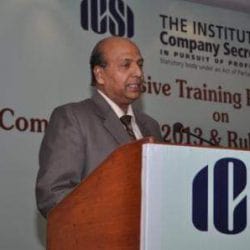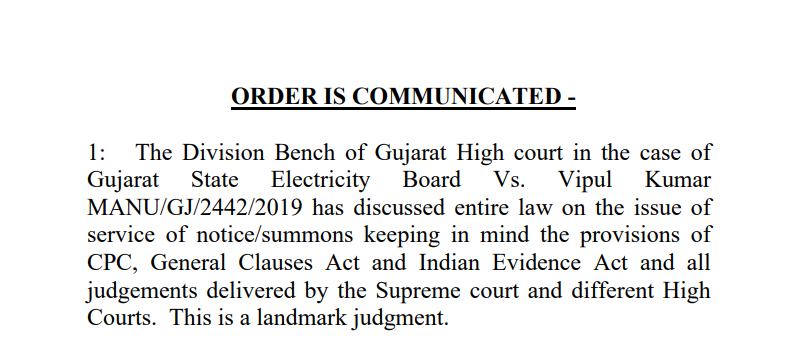Order is Communicated
Table of Contents
ORDER IS COMMUNICATED
1: The Division Bench of Gujarat High court in the case of Gujarat State Electricity Board Vs. Vipul Kumar MANU/GJ/2442/2019 has discussed the entire law on the issue of service of notice/summons keeping in mind the provisions of CPC, General Clauses Act, and Indian Evidence Act and all judgments delivered by the Supreme court and different High Courts. This is a landmark judgment.
2: The Supreme Court in State of Punjab v. Khemi Ram – MANU/SC/0434/ held that the word ‘communicate’ cannot be interpreted to mean that the order would become effective only on its receipt by the concerned Government officer. Communication is complete, once the order is put in the course of transmission and, thus, goes out of the control of the authority issuing it. The Division Bench of Delhi High Court in Dinesh Kumar Gupta vs. UOI: MANU/DE/0892/2017 held that “communication was complete when the order/communique was dispatched and handed over to the postal authorities i.e. on 10th November 2012.
” WHAT IS EFFECT “REFUSED” “NOT AVAILABLE ”HOUSE LOCKED”, “NOT AVAILABLE” AND “UNCLAIMED”
3: Section 27 of the General Clauses Act gives rise to a presumption that service of notice has been effected when it is sent to the correct address by registered post. Unless and until the contrary is proved by the addressee, service of notice is deemed to have been effected at the time at which the letter would have been delivered in the ordinary course of business. The Supreme Court has already held that when a notice is sent by registered post and is returned with a postal endorsement “refused” or “not available in the house” or “house locked” or “shop closed” or “addressee not in station,” due service has to be presumed – reference may be had from the judgments in the cases of. Jagdish Singh v. Natthu Singh MANU/SC/0313/1992; State of M.P. v. Hiralal and Ors MANU/SC/1388/1996 Raja Kumari Vs. P. Subbarama Naidu MANU/SC/0937/2004.
4: The Supreme Court in Madan & Co. v. Wazir Jaivir Chand MANU/SC/0313/1988, held that once there is a proper tender of the notice at the correct address, then there is service of the demand notice in view of the presumption as per Section 27 of the General Clauses Act.
5: The SC in Dalmia Cement (Bharat) Ltd. vs. Galaxy Traders and Agencies Ltd. MANU/SC/1722/2001 has observed that “Section 27 of the General Clauses Act deals with the presumption of service of a letter sent by post. The dispatcher of notice has, therefore, a right to insist upon and claim the benefit of such a presumption.
6: The Supreme Court, after an exhaustive review of its earlier judgments, held in Greater Mohali Area Development Authority Vs. Manju Jain MANU/SC/0627/2010 held that in view of the provisions of Section 114, Illustration (f) of the Evidence Act, 1872 and Section 27 of the General Clauses Act, 1897, there is a presumption that the addressee has received the letter sent by registered post. However, the presumption is rebuttable. A similar view has been reiterated by the Supreme Court in Dr. Sunil Kumar Sambhudayal Gupta and Ors. vs. State of Maharashtra, MANU/SC/0947/2010.
PRESUMPTION OF SERVICE OF NOTICE/ORDER IS REBUTTABLE.
7: In Gujarat Electricity Board & Anr. v. Atmaram Sungomal Poshani [MANU/SC/0200/1989, the Supreme Court examined the issue regarding the presumption of service of the letter sent by registered post under Section 27 of the General Clauses Act and held that there is a presumption of service of a letter sent under registered cover… No doubt the presumption is rebuttable and it is open to the party concerned to adduce evidence before the court to rebut the presumption by showing that the address mentioned on the cover was incorrect or that the postal authorities never tendered the registered letter to him
8: The Allahabad High Court in the case of Smt. Vandana Gulati v. Gurmeet Singh reported in MANU/UP/0141/2013 has held that Section 114 of the Indian Evidence Act, 1872 provides that where a letter is shown to have been posted, it may be presumed to have been served in the usual course unless interrupted by disturbance. Section 27 of General Clauses Act, 1872 explains the meaning of service by post and where any document is required to be served by post, its service shall be deemed to be effected by properly addressing, prepaying and posting it to the person concerned by registered post. The Section 114 Indian Evidence Act, 1872 raises a presumption of fact and that of Section 27 of the General Clauses Act, 1897 a presumption of law and the cumulative effect of both the above provisions is that a letter/notice sent by registered post to the person concerned at the proper address shall be deemed to be served upon him in the due course unless the contrary is proved.
Download the copy:
 Advocate Pradeep Kumar
Advocate Pradeep Kumar
PK Mittal BCom Delhi university 1975 LLB Delhi University 1978 FCS Fellow Member of ICSI 1992 1982 to 1992 as CS in Corporate Head Legal Apollo Tyres Ltd 1986 to 1992 1993 onwards Advocate in Delhi High Court CESTAT NCLT = Practcising Indirect Tax and Corporate laws 1993 to till date. Written more than 100 Article on Company Law and Corporate laws Indirect Tax Speaker on Indirect Tax Co Law and IBC in various Seminars Workshop organised by ICAI ICSI and ICMA and other organisations Convenor Core Group on GST of ICSI








